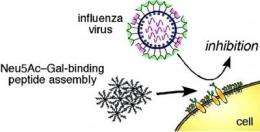Fighting drug-resistant flu viruses

Amid reports that swine flu viruses are developing the ability to shrug off existing antiviral drugs, scientists in Japan are reporting a first-of-its kind discovery that could foster a new genre of antivirals that sidestep resistance problems, according to an article scheduled for the July 23 issue of the ACS' Journal of the Medicinal Chemistry.
Toshinori Sato and colleagues note in the new study that current antiviral drugs, including Tamiflu and Relenza, fight influenza by blocking key proteins that viruses need to reproduce. As the viruses reproduce, however, they can mutate into drug-resistant strains.
The researchers describe discovery of a new way to prevent flu viruses from infecting cells in the first place. They identified potential drugs that can block the first step in the infection process, and demonstrated that the substances work in cell cultures. "These results may lead to a new approach in the design of antiviral drugs," they state, noting that it could be used to develop new drugs for a variety of other medical problems.
More information: "Inhibition of Influenza Virus Infections by Sialylgalactose-Binding Peptides Selected from a Phage Library," Journal of the Medicinal Chemistry.
Source: American Chemical Society (news : web)
















